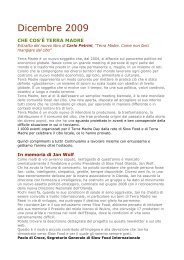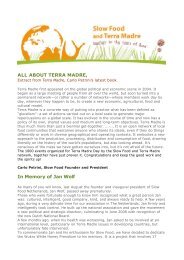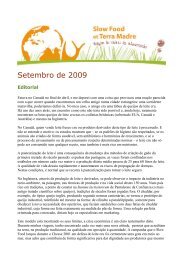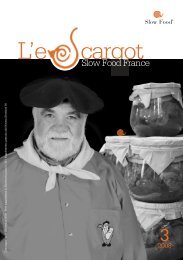all the food that's fit to print The Education Issue - Slow Food
all the food that's fit to print The Education Issue - Slow Food
all the food that's fit to print The Education Issue - Slow Food
You also want an ePaper? Increase the reach of your titles
YUMPU automatically turns print PDFs into web optimized ePapers that Google loves.
Candelario Vazquez grew<br />
up in a migrant farmworking<br />
family whose struggles<br />
led him <strong>to</strong> develop a great<br />
passion for social justice.<br />
He is an Immokalee<br />
native and a member of<br />
<strong>the</strong> Student/Farmworker<br />
Alliance.<br />
and McDonald’s have proven that <strong>the</strong>re is a real hope <strong>to</strong> fin<strong>all</strong>y<br />
modernize and improve conditions in US agriculture, but <strong>the</strong> CIW’s<br />
Campaign for Fair <strong>Food</strong> continues. While fast <strong>food</strong> corporations and<br />
grocery megachains report ever-increasing sales and pro<strong>fit</strong> margins,<br />
<strong>the</strong> farmworkers responsible for picking <strong>the</strong>ir fruits and vegetables<br />
receive piece rates that remain stagnant, now for nearly 30 years. In<br />
<strong>the</strong> most extreme cases, workers <strong>to</strong>il under conditions of modernday<br />
slavery. And o<strong>the</strong>r companies, such as Burger King, still stand in <strong>the</strong> way of continued<br />
progress. Even Whole <strong>Food</strong>s—a chain whose own philosophy proclaims unpar<strong>all</strong>eled support<br />
of sustainable agriculture and whose “Whole Trade Guarantee” pledges <strong>to</strong> ensure, among o<strong>the</strong>r<br />
things, “better wages and working conditions for workers,”—has refused <strong>to</strong> work with <strong>the</strong> CIW.<br />
This doesn’t worry me, however. <strong>Slow</strong>ly but surely, <strong>the</strong> consciousness that began <strong>to</strong> rise in<br />
Immokalee in <strong>the</strong> nearly ‘90s will continue <strong>to</strong> grow, and students and youth will continue <strong>to</strong> be<br />
a powerful voice in this movement. I invite young people <strong>to</strong> learn more about my community,<br />
our struggle, and how our actions can lead <strong>to</strong> a better world.<br />
Cultivating Co-producers<br />
— By Ed Yowell<br />
<strong>Slow</strong> <strong>Food</strong> NYC’s educational series<br />
OK, it doesn’t re<strong>all</strong>y mean “<strong>Slow</strong> University,” it means <strong>Slow</strong> YOU. SLOW U is an ongoing<br />
series of convivial, educational seminars aimed at helping each of us become a<br />
responsible eater, contributing <strong>to</strong>, and savoring, <strong>the</strong> good, clean, and fair <strong>food</strong> chain that <strong>Slow</strong><br />
<strong>Food</strong> supports. It’s been said that we can vote for a sustainable <strong>food</strong> system with every <strong>food</strong><br />
dollar we spend. SLOW U strives <strong>to</strong> make us more educated voters.<br />
Every month or two, <strong>Slow</strong> <strong>Food</strong> NYC sponsors a two-hour seminar featuring <strong>food</strong> providers,<br />
scholars, writers, activists, and <strong>the</strong> like, who speak about <strong>to</strong>pics germane <strong>to</strong> a slow <strong>food</strong> chain.<br />
For instance, we have had authors Sherri Brooks Vin<strong>to</strong>n and Lorna Sass talk respectively about<br />
<strong>the</strong> everyday ch<strong>all</strong>enges of sustainable eating and <strong>the</strong> environmental and health bene<strong>fit</strong>s of<br />
eating more whole grains (and less meat). <strong>Food</strong> activist Fern Gale Estrow talked about <strong>the</strong><br />
politics and impact of <strong>the</strong> <strong>Food</strong> and Farm Bill. Seminars include question and answer periods<br />
and, of course, slow <strong>food</strong> and drink.<br />
Most recently, Vancouverites James MacKinnon and Alisa Smith, authors of Plenty<br />
(published in <strong>the</strong>ir native Canada as <strong>The</strong> Hundred Mile Diet), delivered an entertaining and<br />
informative account of <strong>the</strong>ir year-long adventure eating and drinking only what was grown,<br />
raised, hunted, or foraged within 100 miles of <strong>the</strong>ir Vancouver home. An intense but amiable<br />
discussion followed <strong>the</strong>ir talk, with folks lined up for and against various aspects of <strong>the</strong><br />
concept. (Is it better <strong>to</strong> drink local wine produced from grapes grown convention<strong>all</strong>y or organic<br />
wines flown in from Chile? During <strong>the</strong> nor<strong>the</strong>ast winter, is it better <strong>to</strong> eat local greens grown<br />
in an upstate greenhouse and trucked <strong>to</strong> New York City or greens flown in from <strong>the</strong> sunny<br />
southwest or no greens at <strong>all</strong>?) While nothing was settled, we enjoyed local hard cider, local<br />
farmstead cheese, and bread and lavash, baked loc<strong>all</strong>y using loc<strong>all</strong>y milled flour from loc<strong>all</strong>y<br />
grown wheat, <strong>all</strong> points of origin having been Googled diligently beforehand.<br />
With ticket prices low, SLOW U seminars are gener<strong>all</strong>y sold out, at about 30 <strong>to</strong> 40 seats. Our<br />
venues are inexpensive or donated. Speakers most often donate <strong>the</strong>ir time. <strong>Food</strong> and drink are<br />
not <strong>the</strong> primary purpose, so servings are of tasting size.<br />
Topics and speakers are not so hard <strong>to</strong> find. Many <strong>Slow</strong> <strong>Food</strong> members are also members<br />
of local <strong>food</strong> networks, being <strong>food</strong> providers, scholars, writers, or activists, or <strong>the</strong>y know <strong>the</strong>m.<br />
Gener<strong>all</strong>y, <strong>Slow</strong> <strong>Food</strong> members account for half of SLOW U participation, with non-members<br />
constituting <strong>the</strong> balance. Thus, SLOW U is a way <strong>to</strong> meet and influence new friends.<br />
Future SLOW U seminars include: Pastured Meats: Good for <strong>the</strong> planet, <strong>the</strong> animals, and<br />
<strong>the</strong> eaters; <strong>The</strong> Urban Chicken: Laying hens in city community gardens; and <strong>Food</strong> and Faith:<br />
Religion and a good, clean, and fair <strong>food</strong> chain.<br />
<strong>The</strong> snail | spring 2008<br />
11







